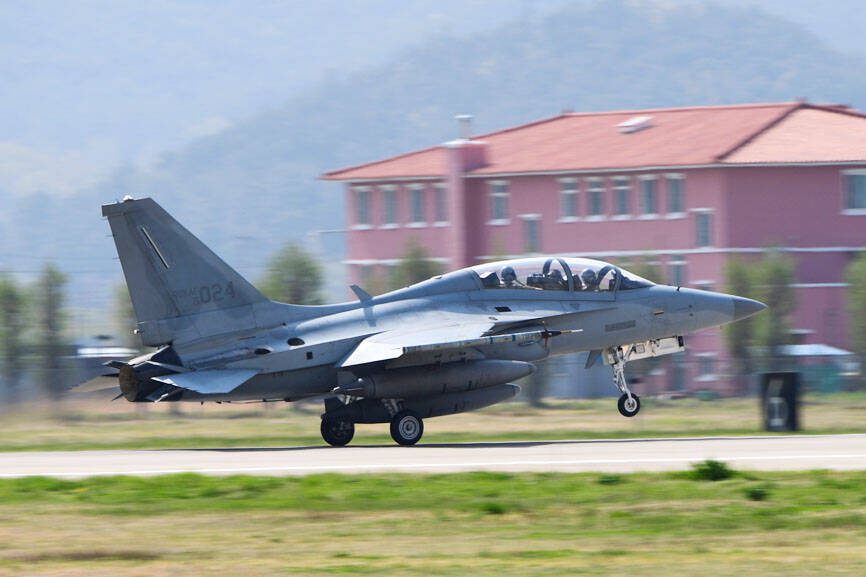North Korea criticized the US for deploying a B-1B strategic bomber in a recent joint military drill with South Korea, describing the move as an “open threat” to Pyongyang’s security, the North’s Korean Central News Agency (KCNA) reported yesterday.
The North Korean Ministry of Defense spokesperson said in a statement carried by KCNA that the deployment of US strategic bombers in the region had become a routine military practice, while calling it “reckless bluffing.”
The B-1B was deployed in a joint military drill between South Korea and the US on Tuesday along with fighter jets, the South Korean Ministry of Defense said.

Photo: EPA-EFE
Jeon Ha-kyu, spokesman for the South’s defense ministry, rejected North Korea’s criticism and said in a briefing that the military activities were defensive in nature.
B-1B bombers have been featured in joint military exercises in the past few years that North Korea has denounced as a rehearsal for war against it, while Seoul has portrayed the exercises as purely defensive.
“The recent military move of the US and the ROK is an open threat to the security of our state and a grave provocation that raises the military tension in the region to an extreme dangerous level,” the KCNA statement said, referring to South Korea’s official name, the Republic of Korea.
The statement said that North Korea “will deter by dint of powerful force the US aggressive attempt to permanently fix the malignant instability element in the security environment of the region.”
The air forces of South Korea and the US yesterday started a two-week joint exercise known as “Freedom Flag,” the South’s defense ministry said, with fifth-generation stealth fighter jets deployed to take on the role of a mock enemy in training.
Additional reporting by AP

INVESTIGATION: The case is the latest instance of a DPP figure being implicated in an espionage network accused of allegedly leaking information to Chinese intelligence Democratic Progressive Party (DPP) member Ho Jen-chieh (何仁傑) was detained and held incommunicado yesterday on suspicion of spying for China during his tenure as assistant to then-minister of foreign affairs Joseph Wu (吳釗燮). The Taipei District Prosecutors’ Office said Ho was implicated during its investigation into alleged spying activities by former Presidential Office consultant Wu Shang-yu (吳尚雨). Prosecutors said there is reason to believe Ho breached the National Security Act (國家安全法) by leaking classified Ministry of Foreign Affairs information to Chinese intelligence. Following interrogation, prosecutors petitioned the Taipei District Court to detain Ho, citing concerns over potential collusion or tampering of evidence. The

‘FORM OF PROTEST’: The German Institute Taipei said it was ‘shocked’ to see Nazi symbolism used in connection with political aims as it condemned the incident Sung Chien-liang (宋建樑), who led efforts to recall Democratic Progressive Party (DPP) Legislator Lee Kun-cheng (李坤城), was released on bail of NT$80,000 yesterday amid an outcry over a Nazi armband he wore to questioning the night before. Sung arrived at the New Taipei City District Prosecutors’ Office for questioning in a recall petition forgery case on Tuesday night wearing a red armband bearing a swastika, carrying a copy of Adolf Hitler’s Mein Kampf and giving a Nazi salute. Sung left the building at 1:15am without the armband and apparently covering the book with a coat. This is a serious international scandal and Chinese

Seventy percent of middle and elementary schools now conduct English classes entirely in English, the Ministry of Education said, as it encourages schools nationwide to adopt this practice Minister of Education (MOE) Cheng Ying-yao (鄭英耀) is scheduled to present a report on the government’s bilingual education policy to the Legislative Yuan’s Education and Culture Committee today. The report would outline strategies aimed at expanding access to education, reducing regional disparities and improving talent cultivation. Implementation of bilingual education policies has varied across local governments, occasionally drawing public criticism. For example, some schools have required teachers of non-English subjects to pass English proficiency

TRADE: The premier pledged safeguards on ‘Made in Taiwan’ labeling, anti-dumping measures and stricter export controls to strengthen its position in trade talks Products labeled “made in Taiwan” must be genuinely made in Taiwan, Premier Cho Jung-tai (卓榮泰) said yesterday, vowing to enforce strict safeguards against “origin laundering” and initiate anti-dumping investigations to prevent China dumping its products in Taiwan. Cho made the remarks in a discussion session with representatives from industries in Kaohsiung. In response to the US government’s recent announcement of “reciprocal” tariffs on its trading partners, President William Lai (賴清德) and Cho last week began a series of consultations with industry leaders nationwide to gather feedback and address concerns. Taiwanese and US officials held a videoconference on Friday evening to discuss the